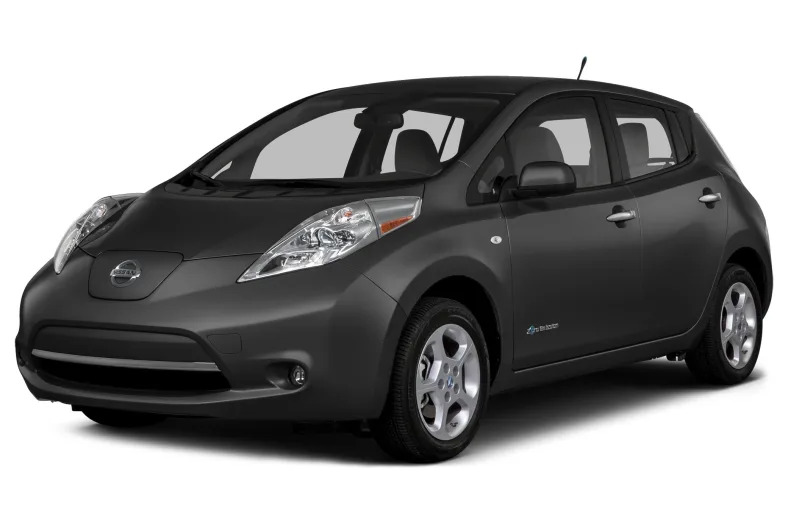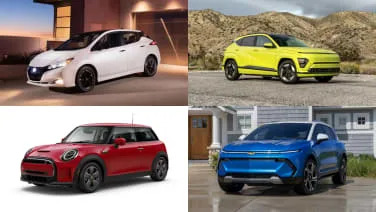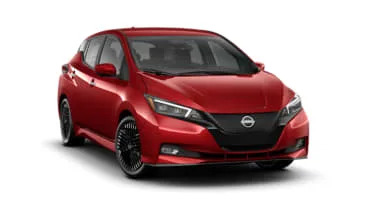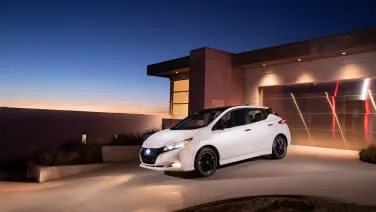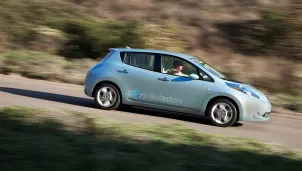2013 Nissan LEAF
The Nissan Leaf is an all-electric, four-door compact car that seats five. When it debuted for the 2011 model year, it was the first mass-production all-electric vehicle to go on sale in the U.S. with a starting price of more than $30,000. With newer electric cars nipping at the Leaf's heels, Nissan has introduced a new base model for 2013 that starts at just $28,800. The 2013 Nissan Leaf is assembled at Nissan's plant in Smyrna, Tennessee, whereas 2011 and 2012 models were built in Japan. LEAF is an acronym for Low Emission Automobile of the Future. A 24 kWh lithium-ion battery pack powers an 80-kilowatt electric motor, good for 107 horsepower and 207 pound-feet of torque. Improvements to the 2013 Leaf include improved aerodynamics, more efficient regenerative braking, and better vehicle energy management, resulting in better Environmental Protection Agency numbers to the tune of 130/102 MPGe City/Highway energy efficiency equivalent rating and an EPA-estimated range of 75 miles. By comparison, the 2012 Leaf was rated at 106/92 MPGe with an estimated range of 73 miles. Also, the EPA changed its methodologies this year for determining EV range, so the Leaf's improvements are more significant than the numbers indicate. Under the old system, the 2013 Nissan Leaf would have received an EPA range estimate rating of 84 miles. As with all electric vehicles, the actual range will vary based on driving style, speed, weather, temperature and battery age.
In addition to improved efficiency and the new entry-level model, the 2013 Nissan Leaf gets a new 6.6-kW onboard charger, which is optional on the base model and standard on upper trims. With it, the 2013 Leaf can fully charge in about four hours using a 240-volt fast charger, about half the time it took previously. Several new standard and optional features are available on the 2013 Leaf across all trim levels.
The Leaf is a zero-tailpipe-emissions vehicle; the tailpipe bit is important, since no vehicle is truly zero-emissions when production and distribution (and, in this case, charging) are taken into account. The Leaf uses partially recycled materials in the fabric upholstery found in the mid-level SV trim, made in part from recycled water bottles. It also uses a range of other wood and plastic recycled and recyclable materials in its interior and exterior design. Nissan claims the Leaf is the greenest production car ever built, and is about 94 percent recyclable.
Like other alternative fuel vehicles, the Leaf qualifies for federal, and in some cases, state and/or local tax credits. The benefits of owning this type of vehicle may not all be measured in dollars and cents, however. Some states offer HOV high-occupancy vehicle stickers for electric and hybrid vehicles, which give access to coveted carpool lanes even when the driver is solo. For those who slog through stop-and-go traffic twice a day, this perk could bring welcome relief. Although it's wise to keep in mind that in crowded cities like Los Angeles, the congested commute lanes don't move much faster. …
Full Review
Full Review
By comparison, the 2012 Leaf was rated at 106/92 MPGe with an estimated range of 73 miles. Also, the EPA changed its methodologies this year for determining EV range, so the Leaf's improvements are more significant than the numbers indicate. Under the old system, the 2013 Nissan Leaf would have received an EPA range estimate rating of 84 miles. As with all electric vehicles, the actual range will vary based on driving style, speed, weather, temperature and battery age.
In addition to improved efficiency and the new entry-level model, the 2013 Nissan Leaf gets a new 6.6-kW onboard charger, which is optional on the base model and standard on upper trims. With it, the 2013 Leaf can fully charge in about four hours using a 240-volt fast charger, about half the time it took previously. Several new standard and optional features are available on the 2013 Leaf across all trim levels.
The Leaf is a zero-tailpipe-emissions vehicle; the tailpipe bit is important, since no vehicle is truly zero-emissions when production and distribution (and, in this case, charging) are taken into account. The Leaf uses partially recycled materials in the fabric upholstery found in the mid-level SV trim, made in part from recycled water bottles. It also uses a range of other wood and plastic recycled and recyclable materials in its interior and exterior design. Nissan claims the Leaf is the greenest production car ever built, and is about 94 percent recyclable.
Like other alternative fuel vehicles, the Leaf qualifies for federal, and in some cases, state and/or local tax credits. The benefits of owning this type of vehicle may not all be measured in dollars and cents, however. Some states offer HOV high-occupancy vehicle stickers for electric and hybrid vehicles, which give access to coveted carpool lanes even when the driver is solo. For those who slog through stop-and-go traffic twice a day, this perk could bring welcome relief. Although it's wise to keep in mind that in crowded cities like Los Angeles, the congested commute lanes don't move much faster. …
Hide Full Review
Retail Price
| Engine | |
| MPG | Up to 129 city / 102 highway |
| Seating | 5 Passengers |
| Transmission | 1-spd auto |
| Power | 107 @ rpm |
| Drivetrain | front-wheel |
| Curb Weight | 3,256 - 3,340 lbs |

